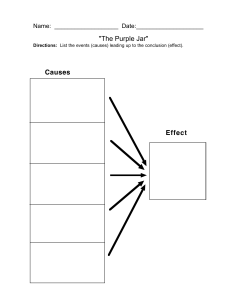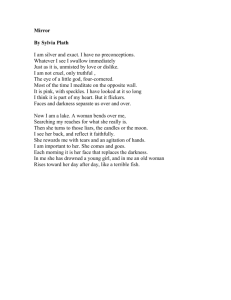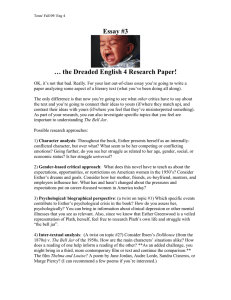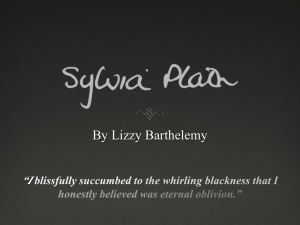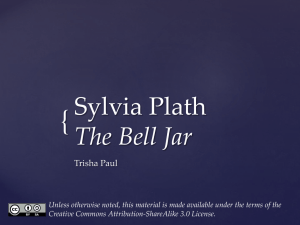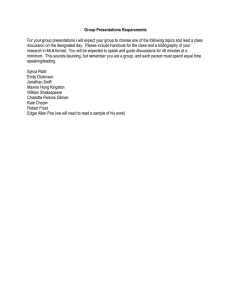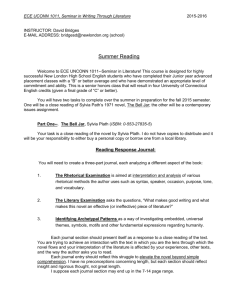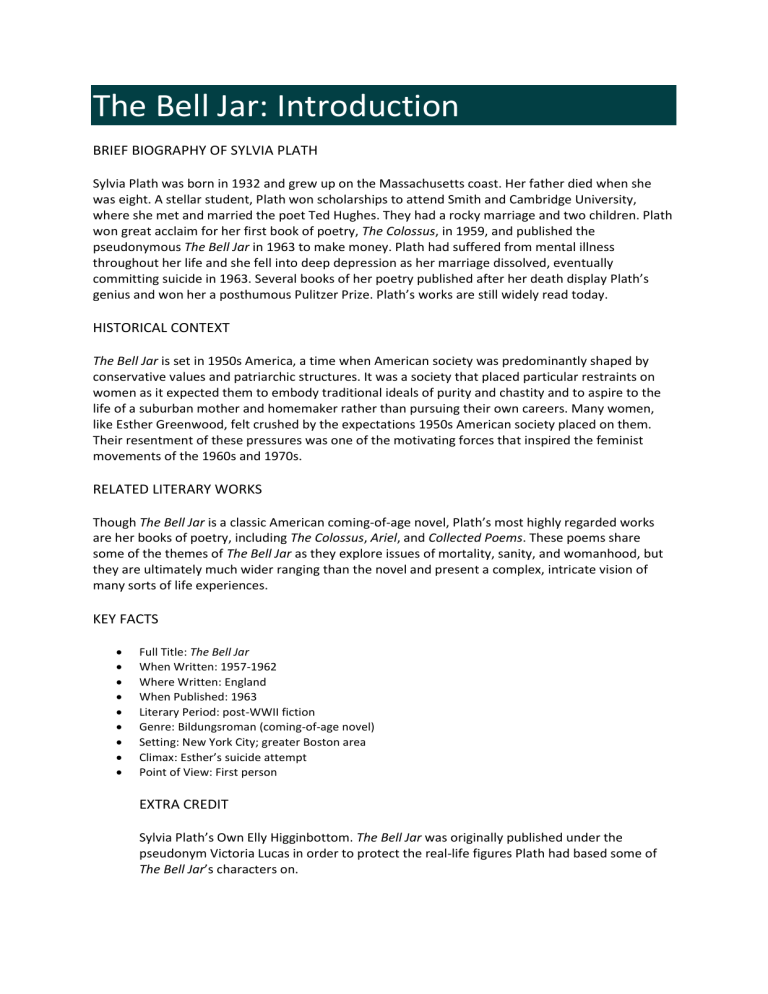
The Bell Jar: Introduction BRIEF BIOGRAPHY OF SYLVIA PLATH Sylvia Plath was born in 1932 and grew up on the Massachusetts coast. Her father died when she was eight. A stellar student, Plath won scholarships to attend Smith and Cambridge University, where she met and married the poet Ted Hughes. They had a rocky marriage and two children. Plath won great acclaim for her first book of poetry, The Colossus, in 1959, and published the pseudonymous The Bell Jar in 1963 to make money. Plath had suffered from mental illness throughout her life and she fell into deep depression as her marriage dissolved, eventually committing suicide in 1963. Several books of her poetry published after her death display Plath’s genius and won her a posthumous Pulitzer Prize. Plath’s works are still widely read today. HISTORICAL CONTEXT The Bell Jar is set in 1950s America, a time when American society was predominantly shaped by conservative values and patriarchic structures. It was a society that placed particular restraints on women as it expected them to embody traditional ideals of purity and chastity and to aspire to the life of a suburban mother and homemaker rather than pursuing their own careers. Many women, like Esther Greenwood, felt crushed by the expectations 1950s American society placed on them. Their resentment of these pressures was one of the motivating forces that inspired the feminist movements of the 1960s and 1970s. RELATED LITERARY WORKS Though The Bell Jar is a classic American coming-of-age novel, Plath’s most highly regarded works are her books of poetry, including The Colossus, Ariel, and Collected Poems. These poems share some of the themes of The Bell Jar as they explore issues of mortality, sanity, and womanhood, but they are ultimately much wider ranging than the novel and present a complex, intricate vision of many sorts of life experiences. KEY FACTS Full Title: The Bell Jar When Written: 1957-1962 Where Written: England When Published: 1963 Literary Period: post-WWII fiction Genre: Bildungsroman (coming-of-age novel) Setting: New York City; greater Boston area Climax: Esther’s suicide attempt Point of View: First person EXTRA CREDIT Sylvia Plath’s Own Elly Higginbottom. The Bell Jar was originally published under the pseudonym Victoria Lucas in order to protect the real-life figures Plath had based some of The Bell Jar’s characters on. Ghost Titles. Before settling on The Bell Jar, Plath considered titling the novel Diary of a Suicide or The Girl in the Mirror. The Bell Jar: Opening (pages 1-3) It was a queer, sultry summer, the summer they electrocuted the Rosenbergs, and I didn't know what I was doing in New York. I'm stupid about executions. The idea of being electrocuted makes me sick, and that's all there was to read about in the papers-goggleeyed headlines staring up at me on every street corner and at the fusty, peanut-smelling mouth of every subway. It had nothing to do with me, but I couldn't help wondering what it would be like, being burned alive all along your nerves. I thought it must be the worst thing in the world. New York was bad enough. By nine in the morning the fake, country-wet freshness that somehow seeped in overnight evaporated like the tail end of a sweet dream. Mirage-gray at the bottom of their granite canyons, the hot streets wavered in the sun, the car tops sizzled and glittered, and the dry, cindery dust blew into my eyes and down my throat. I kept hearing about the Rosenbergs over the radio and at the office till I couldn't get them out of my mind. It was like the first time I saw a cadaver. For weeks afterward, the cadaver's head--or what there was left of it--floated up behind my eggs and bacon at breakfast and behind the face of Buddy Willard, who was responsible for my seeing it in the first place, and pretty soon I felt as though I were carrying that cadaver's head around with me on a string, like some black, noseless balloon stinking of vinegar. (I knew something was wrong with me that summer, because all I could think about was the Rosenbergs and how stupid I'd been to buy all those uncomfortable, expensive clothes, hanging limp as fish in my closet, and how all the little successes I'd totted up so happily at college fizzled to nothing outside the slick marble and plate-glass fronts along Madison Avenue.) I was supposed to be having the time of my life. I was supposed to be the envy of thousands of other college girls just like me all over America who wanted nothing more than to be tripping about in those same size-seven patent leather shoes I'd bought in Bloomingdale's one lunch hour with a black patent leather belt and black patent leather pocketbook to match. And when my picture came out in the magazine the twelve of us were working on drinking martinis in a skimpy, imitation silverlamé bodice stuck on to a big, fat cloud of white tulle, on some Starlight Roof, in the company of several anonymous young men with all-American bone structures hired or loaned for the occasion-everybody would think I must be having a real whirl. Look what can happen in this country, they'd say. A girl lives in some out-of-the-way town for nineteen years, so poor she can't afford a magazine, and then she gets a scholarship to college and wins a prize here and a prize there and ends up steering New York like her own private car. Only I wasn't steering anything, not even myself.I just bumped from my hotel to work and to parties and from parties to my hotel and back to work like a numb trolleybus. I guess I should have been excited the way most of the other girls were, but I couldn't get myself to react. (I felt very still and very empty, the way the eye of a tornado must feel, moving dully along in the middle of the surrounding hullabaloo.) There were twelve of us at the hotel. We had all won a fashion magazine contest, by writing essays and stories and poems and fashion blurbs, and as prizes they gave us jobs in New York for a month, expenses paid, and piles and piles of free bonuses, like ballet tickets and passes to fashion shows and hair stylings at a famous expensive salon and chances to meet successful people in the field of our desire and advice about what to do with our particular complexions. I still have the makeup kit they gave me, fitted out for a person with brown eyes and brown hair: an oblong of brown mascara with a tiny brush, and a round basin of blue eye-shadow just big enough to dab the tip of your finger in, and three lip- sticks ranging from red to pink, all cased in the same little gilt box with a mirror on one side. I also have a white plastic sunglasses case with colored shells and sequins and a green plastic starfish sewed onto it. I realized we kept piling up these presents because it was as good as free advertising for the firms involved, but I couldn't be cynical. I got such a kick out of all those free gifts showering on to us. For a long time afterward I hid them away, but later, when I was all right again, I brought them out, and I still have them around the house. I use the lipsticks now and then, and last week I cut the plastic starfish off the sunglasses case for the baby to play with. So there were twelve of us at the hotel, in the same wing on the same floor in single rooms, one after the other, and it reminded me of my dormitory at college. Work in pairs: Discuss the following questions. 1. Who were the Rosenburgs? Find some background information. 2. What does the opening sentence suggest about the themes in the book? 3. Provide two examples of sensory detail which the author uses in these opening pages. 4. What do the opening pages suggest about the narrator’s mental health? Provide evidence from the text. 5. Why should the narrator be the envy of thousands of other college girls? 6. Why did the young women keep getting presents from companies? 7. Why might this make some people cynical? 8. Why couldn’t the narrator be cynical? 9. What it’s like to live in a dormitory? Share some of your ideas with the class. Homework: Write answers to the above questions and upload to Managebac.
